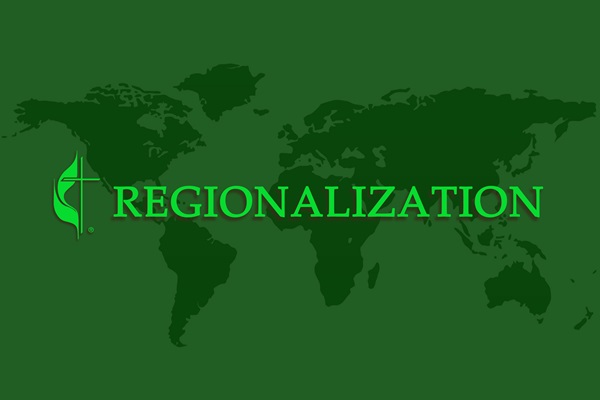The short answer is “not much in the near term.” While the scale of the changes regionalization will bring are substantial, the effects of those changes will take some time to unfold. Between now and the next General Conference in 2028, the only substantial change is that the General and Jurisdictional Conference delegates each annual conference elects will also serve as the delegates to the U.S. Regional Conference when it meets in late 2028 or early 2029.
What is the U.S. Regional Conference?
The U.S. Regional Conference is a legislative body with the authority to modify adaptable items in the Book of Discipline in order to enhance the faithfulness and effectiveness of United Methodist ministry in the United States. The U.S. region comprises the five jurisdictions based in the United States.
The 2028 General Conference is expected to consider a final plan for the General Book of Discipline. This plan will include a new Section VII consolidating all items that may be adapted by regional conferences. Having all adaptable legislation in one section of the Discipline will greatly simplify the work of the regional conferences worldwide.
Will this impact the organization of General Conference 2028?
No. Ratification of these constitutional amendments does not create any additional changes to the typical proceedings of the General Conference itself.
A 2024 General Conference legislative action that did not require constitutional changes will change one thing. There will be a United States Regional Committee, composed of all General Conference delegates from the United States, that will meet immediately prior to the opening of the 2028 General Conference. It will address all General Conference legislation that affects the United States only. This will keep such legislation out of the other legislative committees, so that all of those committees can address legislation that affects United Methodists everywhere. However, this committee dissolves upon the convening of the United States Regional Conference.
Delegates to the 2028 General Conference will continue to be elected by the lay and clergy members of each annual conference. The Secretary of the General Conference will assign the number of delegates for each annual conference using the provisions of the current Book of Discipline.
Additional Resources on Regionalization
Will this impact the Standing Committee on Central Conference Matters?
The only impact is a name change. The new name is the Standing Committee on Regional Conference Matters outside the United States.
Will this impact denominations with whom The United Methodist Church has a Concordat?
No. Concordat denominations will continue to send voting delegates to the General Conference as they have.
What is the relationship between the General Book of Discipline and Regional Books of Discipline?
Sections I through VI of the General Book of Discipline will apply to the entire denomination worldwide and are not adaptable by the regional conferences. The items included in Section VII are subject to acceptance and revision by each regional conference. As a result, the Book of Discipline for each regional conference will consist of Sections I through VI as approved by the General Conference combined with its own version of Section VII.
When will the first U.S. Regional Conference convene?
Given the usual six-month period between the conclusion of General Conference and the publication of the finalized Book of Discipline, it is reasonable to expect that the first U.S. Regional Conference will meet no earlier than late 2028 or early 2029.
How are delegates elected to the U.S. Regional Conference?
Each annual conference will elect its lay and clergy delegates to the General and Jurisdictional Conference delegates using its normal election processes. These delegates, together, will also be the delegates to the U.S. Regional Conference.
What is the difference in what the U.S. Regional Conference and Jurisdictional Conferences do?
Outside the United States, where there are no jurisdictional conferences, regional conferences perform three kinds of functions: elective, administrative and legislative. The U.S. Jurisdictional Conferences currently perform elective and administrative functions. This means the U.S. Regional Conference will function primarily as a legislative body focused on adapting Part VII of the General Book of Discipline for U.S. contexts. The U.S. Jurisdictional Conferences will continue to elect and assign bishops, elect members to the boards of general agencies and other jurisdictional and churchwide bodies and manage administrative matters within their respective areas.
What lies ahead for the U.S. Jurisdictional Conferences?
Between now and the 2028 U.S. Jurisdictional Conferences, the answer is “nothing new.”
The U.S. Jurisdictional Conferences will convene in July 2028 to elect and assign bishops and fulfill their other elective and administrative responsibilities as they have since 1940.
Should the constitution at some point no longer provide for jurisdictional conferences in the United States, subsequent elections of U.S. bishops and their assignment to annual conferences would occur at the U.S. Regional Conference, as is done in all other regional conferences.
Meanwhile, the Standing Committee on Regional Conferences outside the United States and the Connectional Table are jointly conducting a study on the possible futures of jurisdictions in United Methodist polity. They will bring the findings of their story to the 2028 General Conference.
In addition to these findings, constitutional amendments and other legislation that could affect jurisdictional conferences could come to the 2028 General Conference. If the 2028 General Conference approves any such amendments by the required 2/3 vote, the earliest date for announcing the results of annual conference voting on ratification would be late fall 2029. Additional time would be required to manage the legal processes to transfer property, assets, and legal responsibilities of the jurisdictions to the U.S. Regional Conference, likely extending into 2030.
When do regional conference decisions go into effect?
Unless otherwise specified in the legislation it passes, revisions adopted by regional conferences go into effect upon the publication of its finalized version of Part VII.
Burton Edwards serves as Lead for Ask The UMC, the information service of United Methodist Communications.





